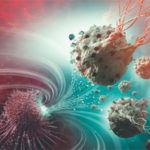
Researchers from the Polytechnique Montreal NanoRobotics Laboratory showed that magnetic bacteria can be used as a vehicle for cancer-fighting drugs.
The study, funded in part by the National Institute of Biomedical Imaging & Bioengineering, was published in the August 2016 issue of Nature Nanotechnology.
Traditional drug-delivery techniques using nanoparticles have a hard time fully penetrating tumor cells and getting into the regions of active cell division. Those regions are hypoxic – low in oxygen – meaning the change in pressure makes it challenging for the nanoparticle to travel into the cell. Researchers estimate that 2% of drugs delivered with standard nanoparticle carriers make it into the targeted cells.
In the study, researchers examined the efficacy of bacteria that thrive in hypoxic waters. The magnetococcus marinus (MC-1) bacterium has a 2-pronged navigation system – magnetic nanocrystals which cause them to swim north in the Northern Hemisphere and sensors that detect changes in oxygen levels.
In their 1st experiment, researchers injected the bacteria into mice infected with human colorectal tumors. They used a computer-programmed magnetic field to guide the bacteria to the tumor and then turned off the field, trapping the bacteria in the tumor.
“When they get inside the tumor, we switch off the magnetic field and the bacteria automatically rely on the oxygen sensors to seek out the hypoxic areas,” lead researcher Sylvain Martel explained. “We constrain them to the tumor and then let nature do the rest.”
Then the researchers loaded the bacterial cells with vesicles filled with drugs and attempted to deliver the drugs to the infected tissue. They reported that 55% of the bacterial cells made it into the tumors.
“These bacteria are really the perfect machine. They replicate, they’re cheap, and we can inject hundreds of millions or more at a time,” Martel said.
“This proof-of-concept work shows the potential to tap into the intricate and optimized cell machinery of single celled organisms such as bacteria,” Richard Conroy, director of the Division of Applied Sciences and Technology at NIBIB, said in prepared remarks. “The ability to actively and precisely target drug delivery to a tumor will help reduce side effects and potentially improve the efficacy of treatments.”
Next, the researchers said, they hope to evaluate how the drugs delivered via the magnetic bacteria affect tumor size and they will explore cancers that aren’t as easily accessible.

